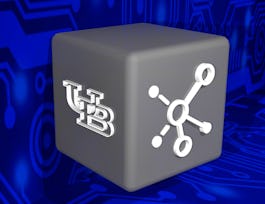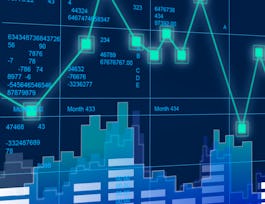DeFi and the Future of Finance is a set of four courses that focus on decentralized finance. The third course is called DeFi Deep Dive. It is essential that you do the first two courses I. DeFi Infrastructure and II. DeFi Primitives before doing this course. It is the longest of the four courses and focuses on some of the leading protocols in the DeFi space. We will look at Credit and Lending (and feature MakerDAO, Compound and Aave), Decentralized Exchange with an analysis of how protocols like Uniswap and Balancer works, Derivatives (featuring Yield Protocol, dYdX and Synthetix) and Tokenization with an analysis of Set Protocol as well as wrapped bitcoin. For many of these leading protocols, we include detailed examples of how the mechanics work. For example, we show how to use a dYdX flash swap to execute an arbitrage transaction (take advantage of different prices on different exchanges for the same asset).



Decentralized Finance (DeFi) Deep Dive
This course is part of Decentralized Finance (DeFi): The Future of Finance Specialization

Instructor: Cam Harvey
Sponsored by RIA PAYMENT INSTITUTION
13,850 already enrolled
(278 reviews)
Recommended experience
What you'll learn
Mechanics of credit and lending protocols; Decentralized exchange implementations; Derivatives and tokenization protocols.
Skills you'll gain
Details to know

Add to your LinkedIn profile
4 assignments
See how employees at top companies are mastering in-demand skills

Build your subject-matter expertise
- Learn new concepts from industry experts
- Gain a foundational understanding of a subject or tool
- Develop job-relevant skills with hands-on projects
- Earn a shareable career certificate


Earn a career certificate
Add this credential to your LinkedIn profile, resume, or CV
Share it on social media and in your performance review

There are 4 modules in this course
We begin module one with the mechanics of MakerDAO stablecoin called DAI and introduce the idea of collateralized debt obligations. The module also includes a detailed examination of both Compound and Aave.
What's included
9 videos1 reading1 assignment
The second module explores the mechanics of Uniswap v2 and v3. A generalization of the two asset Automated Market Maker introduced by Balancer is also studied. The module ends with a discussion of rehypothecation as well as Total Locked Value.
What's included
6 videos1 assignment
The third model features leading derivatives protocols. The mechanics of fixed rate lending and borrowing is presented with the Yield Protocol. The mechanics of dYdX and Synthetix are also explored.
What's included
8 videos1 assignment
The final module focuses on tokenization and features the Set Protocol. Set provides a way to combine portfolios much like an ETF holds many traditional stocks. The Sets can be active or passive. The module ends with a discussion of the use in DeFi of both wrapped bitcoin and wrapped ethereum.
What's included
2 videos1 assignment
Instructor

Offered by
Why people choose Coursera for their career




Learner reviews
278 reviews
- 5 stars
92.14%
- 4 stars
6.78%
- 3 stars
0.71%
- 2 stars
0.35%
- 1 star
0%
Showing 3 of 278
Reviewed on May 1, 2022
What's more to knowledge than a balance of theory with practice. This course is quite some depth and exciting.
Reviewed on Feb 19, 2022
Excellent introduction to complex topics. This course doesn't go too deep into the details, but provide a great overview of the topics of DeFi derivatives and complex instruments.
Reviewed on Jan 20, 2022
Concise coverage and clear explanation of various DeFi mechanisms and protocals.
Recommended if you're interested in Business


University at Buffalo


Board Infinity


University of London


Corporate Finance Institute

Open new doors with Coursera Plus
Unlimited access to 10,000+ world-class courses, hands-on projects, and job-ready certificate programs - all included in your subscription
Advance your career with an online degree
Earn a degree from world-class universities - 100% online
Join over 3,400 global companies that choose Coursera for Business
Upskill your employees to excel in the digital economy


